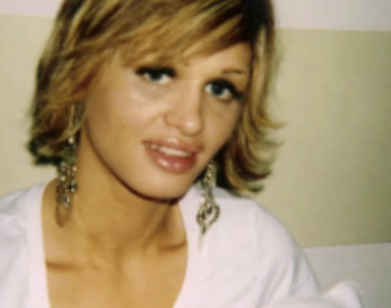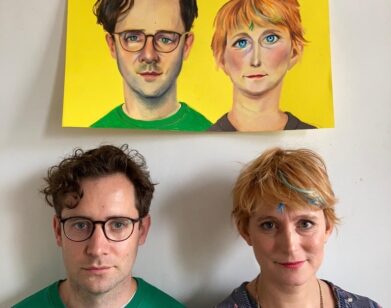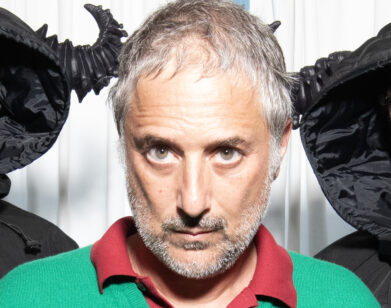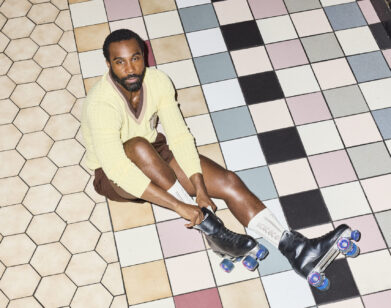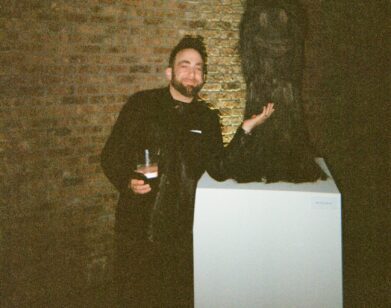Michael Rapaport’s Vision Quest
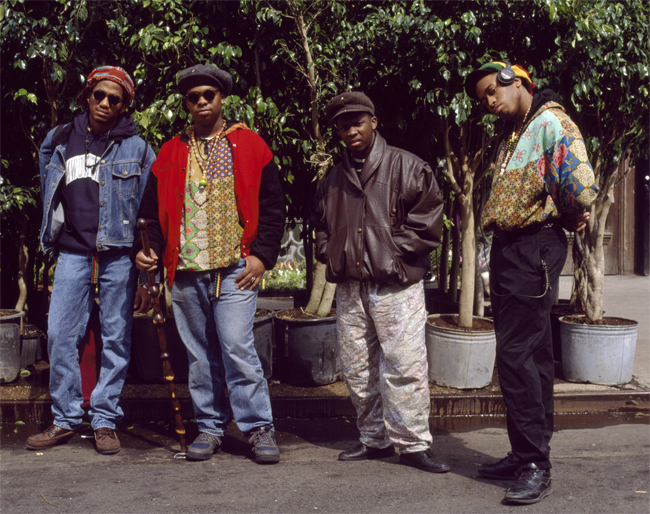
MICHAEL RAPAPORT (CENTER) FILMING BEATS, RHYMES & LIFE.
New York-born actor Michael Rapaport (Boston Public) grew up loving hip-hop—so it only made sense that he’d eventually set out to direct a documentary about his favorite group, A Tribe Called Quest. Beats, Rhymes & Life: The Travels of a Tribe Called Quest follows the legendary group’s four members, Q-Tip, Phife Dawg, Ali Shaheed Muhammad, and Jarobi White. From humble beginnings in Queens to sold-out shows worldwide, their songs—among them “Bonita Applebum,” “Electric Relaxation,” and “Can I Kick It?”—were game-changers in the hip-hop game. While Tribe’s music was positive and uplifting, there was dissension forming behind the scenes. The group that paved the way for so many that followed broke up in 1998.
In 2008, Tribe got back together to tour again. Rapaport saw the opportunity to travel with them and follow their journey on and offstage. “I wanted to document A Tribe Called Quest the same way the great rock groups of the ’60s and ’70s have been documented, like The Rolling Stones, The Beatles and Led Zeppelin,” reflected Rapaport. “I didn’t realize that when we started making the film there hasn’t been an independently made high-end documentary about a hip-hop group.” The result is the compelling story of four friends and how their lives changed as they changed the face of music.
STEVEN PRIGGE: What effect did hip-hop music have on you growing up?
MICHAEL RAPAPORT: The effect hip-hop had on me was enormous. I was exposed to it by happenstance. My father worked at a radio station in New York called WKTU Disco 92. It was the first radio station in New York City to play disco in the late ’70s. One day, he brought home a promotional copy of Rapper’s Delight by the Sugarhill Gang. I listened to this record over and over. I was just enthralled. He brought home more promotional copies he would get at the radio station, and the music really changed the course of my life. It became the soundtrack of my youth. Growing up in New York City, listening and waiting by the radio late at night to hear what they were going to play was exciting and a special memory for me.
PRIGGE: When was the first time when you heard A Tribe Called Quest?
RAPAPORT: It was ’87 or ’88 on 98.7 Kiss FM in New York. I heard Q-Tip in a group called the Jungle Brothers off their record called The Promo. He was rhyming, and I noticed his voice and flow. He said, “Q-Tip from A Tribe Called Quest.” I was curious about them, and then a few months later their album came out. I immediately became a fan. I loved the dynamic of their music and the feeling it gave me. When I was a kid, my first favorite song was probably Lou Reed’s “Walk on the Wild Side.” For a rap group to sample Lou Reed’s song like they did with “Can I Kick It?,” along with the way they flowed and the things they were saying, it captured my attention. At the time, using a mellow rock sample in a song was very unique and it stood out to me and to a lot of other people.
PRIGGE: When did the idea for the documentary first evolve?
RAPAPORT: I was at their last show in ’98 at Tramps in New York City. It was a great show and a very special night. It was promoted as their last show, and I was disappointed that the group was breaking up. That night, I said to my girlfriend at the time that I felt like my parents were getting divorced. That’s when I started saying that somebody should do a documentary about A Tribe Called Quest. In 2006, they performed at The Wiltern Theater in Los Angeles. They hadn’t performed in a long time, and it was a great show. That night I said to Q-Tip and Phife that somebody should do a documentary about A Tribe Called Quest. And Q-Tip said, “You should do it.” It didn’t get off the ground then, but I started talking to them about it. Two years later, they were headlining the Rock the Bells tour. I asked them again and two weeks later, we started shooting the movie.
PRIGGE: You clearly made this documentary because you were a fan of Tribe, but did you feel that it would appeal to the masses?
RAPAPORT: I knew that the music had appealed to the masses. The music was very inclusive and wound up reaching people that weren’t your normal hip-hop fans. I didn’t make the movie for one particular audience. When we were editing the film, I realized it wouldn’t be just about the music. It was going to be more about this group of friends and it had emotional ties. When something has an emotional chord to it, I respond. When I realized that the film was going to have something very emotional that I could relate to beyond the music, I got excited and I knew that maybe we had a chance to do something special.
PRIGGE: The documentary is not only about Tribe, but explores the origins of hip-hop, which was an extremely innovative time in music.
RAPAPORT: I grew up in New York City in the ’80s, and it was the epicenter of hip-hop. There was no Internet. Cable television wasn’t as broad. I would listen to the radio, hear cars pass by playing a song, or tape songs off of the radio. At that time, there was such an excitement around hip-hop music, and it was evolving on a daily basis. Just like the inception of rock ‘n’ roll, I wanted to show the same thing in this documentary for hip-hop. It was a subculture for a long time and turned into all of the things everyone thought it wouldn’t be and much more.
PRIGGE: When you were a kid, did you walk around the streets of New York City with a boom box?
RAPAPORT: I had a boom box, but I didn’t go too far with it because I had a really, really big one. It was like the size of a suitcase, and I was just a little kid.
A TRIBE CALLED QUEST IN THEIR HEYDAY.
PRIGGE: Tribe’s influence is still relevant in many current artists’ work.
RAPAPORT: You can see it in Outkast, Kanye, Pharrell and The Black Eyed Peas. That was why it was so easy to get so many big people to talk in the documentary. They were really important to a lot of people, both musically and culturally. A Tribe Called Quest and De La Soul made people feel comfortable about being themselves.
PRIGGE: And they were rapping about positive things.
RAPAPORT: You can play “Bonita Applebum” in a kindergarten. It’s a fun, flirty, innocent song. When they say “crazy prophylactics,” they are actually promoting safe sex by just mentioning it.
PRIGGE: Why do you think Tribe originally broke up?
RAPAPORT: I think it was because all of the stereotypical reasons of why groups break up: ego, fame, money, the record label. Nine out of ten times, they will be the first to tell you that people will come up to them and say, “When is Tribe going to do more music?” This is a theme that has happened from The Beatles to Led Zeppelin. There is no crime in wanting to make different music. There is no crime in wanting to go and do a solo album. There is nothing wrong with that. But as a fan, you want that music again that meant so much to you at a certain time. That’s why I made the movie.
PRIGGE: How much say did the group have about what would appear in the documentary?
RAPAPORT: I gave them reasonable say, because I wanted them to feel comfortable and proud of the movie. Some things we agreed on and some things we didn’t agree on. Ultimately, I am happy with the movie that is being released, and it’s the movie that I want being released.
PRIGGE: The last quarter of the documentary really focuses on Phife and his battle with diabetes. Was this something that happened during the making of the movie?
RAPAPORT: It happened when we were shooting. I didn’t know he was going to talk to me about it. When I started interviewing Phife, he along with his mom and wife were so open and honest about it. It added a whole other layer that was important and I felt people would relate to it. I knew the story would take on a bigger meaning.
PRIGGE: At the end of the movie, you go along with Tribe to Japan and Australia two years after their last concert in 2008. How did the fans react to the group overseas and what did you see firsthand about Tribe being a worldwide phenomenon?
RAPAPORT: The shows in Japan and Australia were unbelievable. They were playing in arenas. They never played in Australia before, and people were going crazy, like the Rolling Stones were there. I couldn’t believe it. The fans were singing every word to every song. It’s incredible that hip-hop has spread that far.
PRIGGE: You helped us to learn more about A Tribe Called Quest in this documentary, but what did you learn about yourself while making it?
RAPAPORT: That’s a good question. What I learned about myself from making this movie is that patience is a virtue and sleepless nights can be your friend. Also, if you are making an independent film, you have to be ready for a brawl. I was very intimidated by the process—doing it, editing it, and ultimately finishing it. But it gave me the inner strength to really stick to my guns and believe in myself.
BEATS, RHYMES & LIFE: THE TRAVELS OF A TRIBE CALLED QUEST OPENS JULY 8 IN NEW YORK AND LOS ANGELES. FOR MORE ABOUT THE FILM, CLICK HERE.

